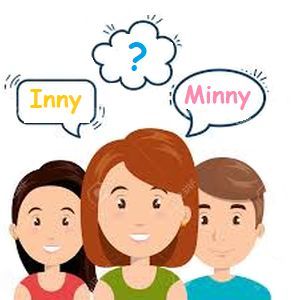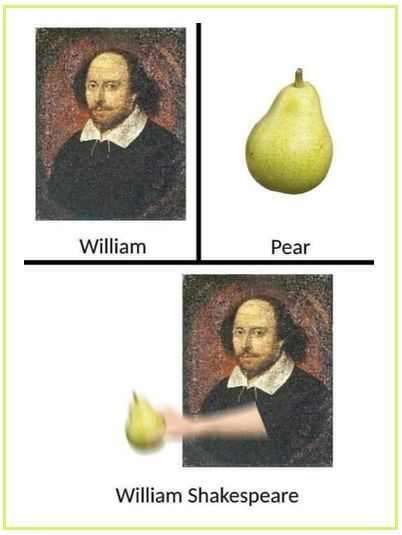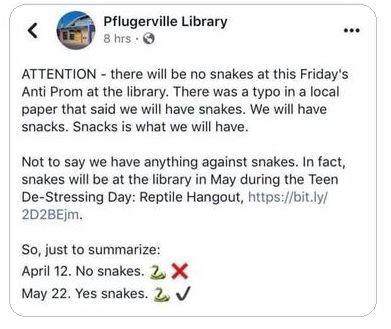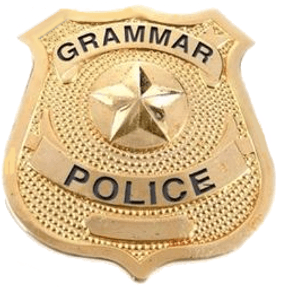 From GrammarBook
From GrammarBook
• An Oxford comma walks into a bar where it spends the evening watching the television getting drunk and smoking cigars.
• A bar was walked into by the passive voice.
• An oxymoron walked into a bar, and the silence was deafening.
• Two quotation marks walk into a "bar."
• A malapropism walks into a bar, looking for all intensive purposes like a wolf in cheap clothing, muttering epitaphs and casting dispersions on his wife, who takes him for granite.
• Hyperbole totally rips into this insane bar and absolutely destroys everything.
• A question mark walks into a bar?
• A non sequitur walks into a bar. In a strong wind, even turkeys can fly.
• Papyrus and Comic Sans walk into a bar. The bartender says, "Sorry—we don't serve your type."
• A mixed metaphor walks into a bar, seeing the handwriting on the wall but hoping to nip it in the bud.
• A comma splice walks into a bar, it has a drink and then leaves.
• Three intransitive verbs walk into a bar. They sit. They converse. They depart.
• A synonym strolls into a tavern.
• At the end of the day, a cliché walks into a bar—fresh as a daisy, cute as a button, and sharp as a tack.
• A run-on sentence walks into a bar it starts flirting. With a cute little sentence fragment.
• A figure of speech literally walks into a bar and ends up getting figuratively hammered.
• An allusion walks into a bar, despite the fact that alcohol is its Achilles heel.
• The subjunctive would have walked into a bar, had it only known.
• A misplaced modifier walks into a bar owned by a man with a glass eye named Ralph.
• The past, present, and future walked into a bar. It was tense.
• A dyslexic walks into a bra.
• A verb walks into a bar, sees a beautiful noun, and suggests they conjugate. The noun declines.
• A simile walks into a bar, as parched as a desert.
• A gerund and an infinitive walk into a bar, drinking to forget.
• A hyphenated word and a non-hyphenated word walk into a bar and the bartender nearly chokes on the irony.
For Punctuation and Grammar Geeks, these walk-into-a-bar jokes are some of the funniest I've ever read/heard. They come via GrammarBook.com, including some from the site's comment section. Thanks for the great laughs, GrammarBook.
Material created and copyrighted by GrammarBook.com.
 By my reckoning, we're at the onset of the next GREAT VOWEL SHIFT. Okay, maybe not "great," but it feels like a vowel shift, nonetheless.
By my reckoning, we're at the onset of the next GREAT VOWEL SHIFT. Okay, maybe not "great," but it feels like a vowel shift, nonetheless.
So what's the Great Vowel Shift, you ask? Well, it took place in England, from approximately 1400-1700, when vowel sounds underwent a profound change. But MORE on that LATER.
The current vowel shift I'm referring to involves the pronunciation of the letters A and E—not the LONG form as in mate or meet, but the SHORT form, mat or met.
Have you noticed the pronunciation for the following words—ANY… MANY… CAN… MEN… BEEN… WHEN… GET? There are more, but these are enough for argument's sake.
If you listen carefully when people speak, you can hear a short-i creeping in? Not the long vowel as in iPhone but the short—as in Fitbit.
Here's what it sounds like—
• Hello. Do you have INNY donuts?
• How MINNY would you like?
• KIN you give me a couple of dozen?
• Sure, even more.
• OK, stop WHIN you get to 100.
Or it sounds like this—
• Now is the time for all good MIN to come to the aid of their country.
A Southern regionalism, you might say. But it's not. You can hear it on national TV, radio, podcasts, and film—and from people in all parts of the country.
So what's happening? Phonetics—it's all about PHONETICS.
Think how much easier it is to say "MIN" rather than "men" … or "INNY" rather than "any." It's easier because the mouth doesn't have to open as widely and the tongue can rest more comfortably in the middle. Phonetically, it's just NOT AS MUCH WORK.
Let's get back to the Great Vowel Shift. No one knows precisely when or where in England it started, or why (theories abound), but the end result was a NOTICEABLE CHANGE in vowel pronunciation.
Mostly it affected the long vowels. BITE once sounded like beet, MATE like maht, BOOT like boat—only three examples, but you get the idea.
Today, some 300 years later—during our own not-so-GREAT VOWEL SHIFT—I wonder if we're KILLLING OFF the short A and E vowels, particularly when followed by the CONSONANT N. I'm as guilty as the next of homicidal tendencies.
Try saying the following words—ones for which I find myself replacing the en sound with in. Here they are: INCOUNTER … INDEAR … INGRAVE … INJOY … INLIVEN … INSURE … INTANGLE … INVELOP (the verb form) … INVIRONMENT. (Don't worry, the spelling won't actually change, just pronunciation.)
Languages are like living organisms, evolving over time. Usually we think it means a change in word usage or the addition of new words to the dictionary, but it also refers to pronunciation. Language is living history, and it SOUNDS like we're in the midst of it.

To shake or not to shake. That is the question.
Whether 'tis nobler in the mind to suffer
the slings and arrows of outrageous surnames…
or just shake the damn pear.

A Tweet, and not from you-know-who. But it's so funny that we felt it was worth sharing.
The Pflugerville Library, btw, is real … as is the town. But you won't find it in Minnesota, or anywhere near Lake Wobegone. Pflugerville is actually in Texas, about 15 miles north of Austin. Go figure.
Gotta love librarians!
 They're off their game … unless maybe they've already thrown in the towel — because sometimes it feels like nobody's out there doing the dirty work, pulling in the perps. I'm talking about the Grammar Police.
They're off their game … unless maybe they've already thrown in the towel — because sometimes it feels like nobody's out there doing the dirty work, pulling in the perps. I'm talking about the Grammar Police.
Celebrities, politicians, pundits, authors, even the vaulted New York Times — all of them — are getting away with grammatical homicide.
This one came in today. It's subtle all right, but indicative of a downward slide into lawlessness. I count 2 "lock-em-ups" right off the bat. So let's read it and unpack it.
There's people that have been trying to line up for the opportunity.
1. THERE'S people
Oops: "people" is plural, so we say, "There are people" or "There're people." We don't say, "There is people" or "There's people."
- There're books in the library. — There's a book on the table.
- There're mice in the field. — There's a mouse in the house.
- There're lots of people. — There's a lot of people.
2. There's people THAT
Oops again: "people" are, well … people, and we use who when referring to homo sapiens. "That" or "which" refers to things.
- The person who gave me the book is my aunt.
- The aunt who gave me the book is my favorite.
- The people who read the book loved it.
- The ones who loved the book are my friends.
Both of these are common crimes. Pay attention and you'll start noticing how often you hear "there's" instead of "there're" … and "that" instead of "who."
Okay, then. Let's have another go at the sentence:
There're people who have been trying to line up for the opportunity.
Even better is this (try to avoid starting a sentence with "there"):
People have been trying to line up for the opportunity.
Let's face it, though: does any of it really matter? For me, it's like fingernails on a chalkboard, but in the larger scope of things … I'm not sure it does matter.
*Oops! Here's another one just in: "There’s help-wanted ads everywhere." —1/11/2018
